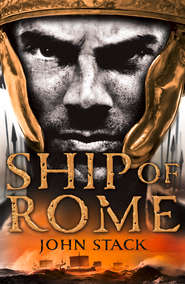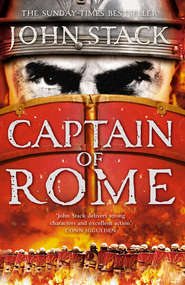По всем вопросам обращайтесь на: info@litportal.ru
(©) 2003-2024.
✖
Armada
Автор
Год написания книги
2018
Настройки чтения
Размер шрифта
Высота строк
Поля
6th July 1587. Plymouth, England.
The crew cheered as the anchor splashed down and the Retribution came to rest, her hull swinging around gently with the pull of the incoming tide. The last of the sails were hauled in and with all able hands on deck the galleon was quickly made secure, the men using their last reserves of strength with an alacrity born of hunger and impatience. Robert was on the quarterdeck and as he looked out over the port he smiled. ‘Home,’ he whispered, drinking in the sight of Plymouth docks
The town looked inviting in the warm July sun. The long sweep of the teeming wharfs was crowned by columns of wood smoke from the cooking fires of the houses beyond, while further back the tower of Saint Andrew’s church gazed over all. The babble of daily activity was borne on the light wind, its timbre and pitch unchanged despite the arrival home of the fleet. Robert glanced at the eight other ships surrounding the Retribution, the remnants of the original fleet that had sailed from this port ten weeks before.
After the sack of Sagres, Drake had ordered the fleet to take station off Cape Saint Vincent. They had intercepted dozens of supply ships bearing all manner of materials for the Armada at Lisbon; timbers for ship-building, oars for galleys and galleasses, and hoops and barrel staves for provisioning the enemy fleet. It had been fruitful labour but as the weeks dragged on an enemy more deadly than the Spanish had begun to attack the fleet; pestilence.
The morale of the fleet had died with the first fatality and as more and more fell ill, Robert, like every other captain, had found it increasingly difficult to keep his crew in check. A sudden violent storm precipitated the first flights towards home, with the smaller ships, under the pretence of necessity, turning for England while they still had sufficient crew to sail them. Even the news of a rich prize approaching the Azores, a trading carrack bound for Lisbon from Genoa, could not stem the tide. Men who had rushed fearlessly into battle cowered before the dreaded ship-fever. The crew of the Golden Lion, with the fleet’s second officer, Borough, on board had turned her bow northwards despite the entreaties of their captain.
Where lesser men might have succumbed, Drake had rallied, persuading the remaining crews to sail west to San Miguel. His resolve had been rewarded and a dawn attack by the last nine ships had yielded an enormous prize – the Sao Phelipe, a Portuguese carrack that was one of the Spanish King’s own vessels. After this enormous coup, Drake had been content to end the expedition and the Elizabeth Bonaventure had finally led the bedraggled fleet home.
Of Robert’s command, seven men had been lost to sickness while another thirty were isolated below decks, the men shivering in their hammocks, crying out in delirium, their bodies racked by fever. Some would survive, God would choose who, and Robert murmured a prayer for all. He wondered, like all sailors, what cursed element triggered the dread disease.
‘The ship is secure, Captain,’ Seeley said, coming up to the quarterdeck. His frame was lean and drawn from the rigours of the previous weeks.
‘Very well,’ Robert replied. ‘Have the men stand down. Mister Powell will need to see each of them before any can disembark to make sure none of them have ship-fever.’
The master nodded. He ordered the ship’s surgeon to the main deck, then called the boatswain to come aft.
‘Captain,’ Seeley began, as Shaw arrived, ‘I would like to question the men one last time before they disembark.’
Robert tried to hide his irritation, but he saw the master’s expression change to a frown of annoyance and knew his own face had betrayed him.
Since the discovery of the idols, Seeley’s search for the Catholic on board had been relentless. Every crewman had been subjected many times to Seeley’s questions while Shaw had assisted his efforts, watching the crew in their unguarded moments below decks when off watch. Many of the crew had reacted with fury when they had first heard of the traitor amongst them. They had vowed to help the master hunt him down but Seeley had refused to trust anyone on board. His obstinate suspicion had eventually put the entire crew on edge, exacerbating the fleet-wide scourges of disease and short supplies.
Robert had been on the cusp of ending the hunt many times, but on each occasion he had hesitated, unsure if his motivation was to guard the dwindling morale of his crew or his own safety. The responsibilities of his rank had continually decided the issue, but at the cost of his patience at Seeley’s ever increasing obsession to cleanse the Retribution of treachery. This final request to question the exhausted crew could not be countenanced.
‘This is our last chance,’ Seeley said. ‘Once the traitor goes ashore he is bound to disappear.’
‘We might still catch him, Captain,’ Shaw added, his own enthusiasm for the hunt fuelled by frustration.
‘No,’ Robert said, ‘there will be no further questioning.’
Seeley was about to protest but Robert held up his hand.
‘You are dismissed, Mister Shaw,’ he said to the boatswain. ‘Inform the men of the morning and fore-noon watches that they may go ashore.’
Shaw hesitated for a second before nodding his assent and leaving the quarterdeck.
Robert drew Seeley over to the bulwark. ‘You have done enough, Thomas,’ he said soothingly, taking a different tack, ‘and God has brought us home safe. Be content with that.’
‘But a traitor still walks amongst us,’ Seeley replied vehemently, glancing unconsciously over his shoulder to the assembled men on the main deck.
‘The man you seek might have fallen at Lagos, or may have been one of those who succumbed to fever and was buried at sea.’
Seeley shook his head. ‘I searched all the belongings of every man who died and found nothing, no further evidence.’
He paused for a moment, searching the captain’s face. ‘Don’t you want to catch the traitor?’ he asked accusingly.
Robert felt his temper flare up but he held it in check. ‘Of course I do, Thomas,’ he said, endeavouring to sound sincere, a hard edge to his voice. ‘But I also have a duty to the crew. They have endured much and deserve to be stood down.’
Seeley could not understand the captain’s priorities. How could he allow for even the slightest possibility that the traitor might escape. The captain was Protestant. Did he not feel the fury that burned in Seeley’s chest at the thought of a Roman Catholic spy amongst them?
Seeley understood the hardships the crew had endured. He had felt them too, but such mortal suffering was nothing to the torments that would befall those who did not tirelessly prosecute the heretic. No one could ignore the warning in Revelations; that those who were neither cold nor hot, but lukewarm in their actions, would be spat out by God.
‘Do not be slothful in zeal, be fervent in spirit, serve the Lord,’ he quoted, desperate to persuade the captain to grant him permission. ‘I tell you, Captain, the Roman Catholic fiend is still alive and even now his breath befouls us all. I must be given one last chance.’
‘They are to be given shore leave in watches,’ Robert said coldly, his patience at an end, knowing that Seeley would not relent. ‘I forbid you from questioning them again. Is that understood?’
The corner of Seeley’s mouth twitched in anger and for a moment he stared into Robert’s eyes. ‘Yes, Captain,’ he growled and strode from the quarterdeck.
Robert watched him go below, his own anger burning the back of his throat. He looked out over Plymouth again, trying to recapture the consolation he had felt only minutes before. It was gone. The veneer had been shattered by Seeley and now the thoughts that had haunted him since the attack on Sagres came back once more. ‘God has brought us home safe. Be content with that,’ he had said to Seeley, but the words were as hollow to him as they had been to the master. Home was not Plymouth. Home was twenty miles east, in Brixham. Robert decided that he would travel there the moment he was relieved of his duty.
The enormous estate house stood nestled on the slope of a vale deep in the heart of Devon. Woodland flanked it on both sides while to the front an ornate garden ran down to the small river that flowed along the valley floor. It was a magnificent house with soaring windows that spoke of the wealth of its owner. The surrounding woodlands hid the myriad buildings attached to the estate save for the spire of a family chapel that reached above even the tallest trees.
On the crest of the opposing slope a copse overlooked the valley floor. It was heavily overgrown with bramble bushes and ferns. Just inside its boundary a man stood motionless. He was John Cross, an agent of the Crown who reported directly to one of the Queen’s closest advisors, Sir Francis Walsingham.
With a steady gaze Cross looked across the breadth of the estate buildings and he smiled contemptuously at the overt display of faith that was the family chapel, vowing silently that one day he would visit the chapel and thank God for the demise of its owner.
A loud snort echoed from the trees behind him and Cross spun around. His horse was tethered some twenty yards away. Cross picked up the sounds of approach a moment later and his hand fell to the pistol in his belt. He crouched slightly, his every sense on alert as he tried to read the sound. He saw a flash of dark clothing, and another, and a figure emerged from the dense undergrowth. Cross straightened up slightly, recognizing the man, but he remained wary, his eyes darting around to ensure he was approaching alone.
‘You’re late,’ he cursed.
‘Beg you pardon, sir,’ the man replied penitently. ‘But I couldn’t get here faster. The good weather has every gardener and gamekeeper abroad.’
Cross grunted angrily. He had been waiting for nearly an hour, a reckless amount of time. His discovery could have disastrous consequences. He stared stonily at the older man as he covered the remaining yards. ‘Well?’
‘The priest was last here nearly two months ago. I let him in myself through the kitchen door. He met with the duke in his private study.’
‘Tell me everything you heard,’ Cross said distractedly, expecting to hear little of any import. The duke was a minor threat, a peripheral player. Cross’s surveillance was merely routine.
The man’s name was Nichols, and his family had been in the service of the Duke of Clarsdale for three generations. Nichols was the duke’s butler, while his wife and three sons were also in the employ of the estate, although Cross had never met them, nor knew if they were aware of Nichols’s clandestine activities. The butler relayed the entire conversation between the duke and the priest with remarkable attention to detail. As he spoke, Cross stepped forward instinctively, the substance of the report was more important than he had imagined.
‘This was their only private meeting?’
‘Yes, the priest stayed only one night. The entire household, including the duke, attended mass shortly after dawn the next day. The priest left immediately after.’
Cross noticed how sneeringly Nichols said mass. His hatred for the ceremony was obvious, made more acute by the fact that he had to masquerade as a faithful Roman Catholic. Cross admired the butler. The risks he himself took were significant but in serving the Crown Nichols had placed his entire family in harm’s way.
Cross asked Nichols to repeat the latter half of the conversation, stopping him at points to question him further. The answers were disturbing. Clarsdale’s plan to build a private army to meet a Spanish invasion was troublesome but not critical. Such a force had been part of nearly every plot that involved a foreign power. A pre-emptive gathering of men would be difficult to conceal however, and could be neutralized long before a Spaniard appeared on the horizon. The duke’s request for an informer in the English fleet was a more alarming prospect. This one man had the potential to be more damaging than a thousand men-at-arms. The composition, deployment and strength of the fleet had to remain secret from the Spanish.
Clarsdale’s request also meant he was in more direct contact with the Spanish than Cross had believed. But through which route? There were a number of prominent English traitors working with the Spanish hierarchy in Spain. Any one of them could be Clarsdale’s handler.
‘The priest hasn’t returned since?’ he asked Nichols.
‘No.’
‘When is he due next?’









